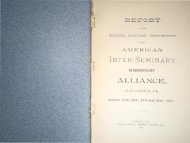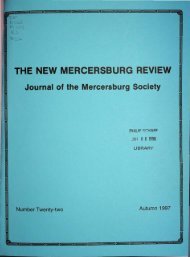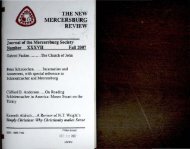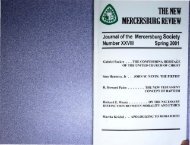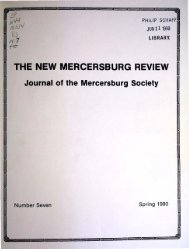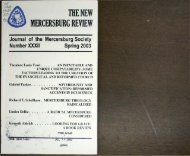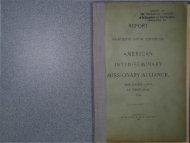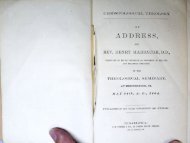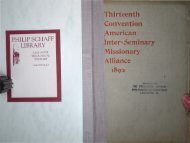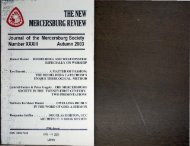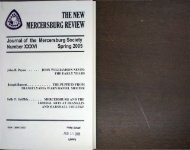Missionary alliance 1888.pdf - DSpace
Missionary alliance 1888.pdf - DSpace
Missionary alliance 1888.pdf - DSpace
- No tags were found...
Create successful ePaper yourself
Turn your PDF publications into a flip-book with our unique Google optimized e-Paper software.
64 INTER-SE~HNARY M[SSIONARY A.f,I,[A.NCE.I would not say they are not wanted by tbe pastor ; I mean, they arenot made welcome by the people in the pews. Those congregations arecomposed chiefly of people with money and good clothes, T he usherreceives the poorly-clad man with cold politeness l and gives h im a backseat, If the back-seats are all full and he should be seated with a ladyof fashion, he is greeted as an inferior being. Behold the Christian fellowsbip!Alas ! has the Church forgot her mission Y TheBe are facts, 'ternble facts, literally occurring every Sunday, and they are felt in alltheir significance by the poor man. Christianity was intended for thepoor as well as for the rich, The Great IIead of tbe Church chose thec~ndi ~ i on of a poor m)\n for his earthly life. Day-laborers were amonghIS friends. Can the re-ligion which he established have been so dealtwith by his followers as to lose its power of ameliorating the poor ruan'scan d" Ihon. ' N ot so in the Roman Catholic church. There, social barriershave ? een broken down. The poor man is not made to feel the stinging?On S ClOU s n~ ss that he is on a lower social plane. Consequently the Roml~h church IS pre-eminently the church of the working man. At every servicethe church is full and a large part of the congregation is composed ofd ay - l ab~rer s, Should the inequalities in wealth and social standing beem ph~l sed by the Roman Catholic church lthe labor class would fleefro~ It a..s they have done from the Protestant. The laborer feels thathe IS an mtruder in the city Protestant church, and so he does not enter.There shou.ld not. be a Christian church in the world in which anv one,w ha~ever hIS statIon, sbould not feel that he is welcome to join in theserViCe. Another reason why the day-laborers are not to be found inthe . P~otest~nt city churches is because they identify the ProtestantchrIstians . With the capitalists ' They see thaI tho se c h urc h es are malDt~me d by persons of wealth, and consequently to them the Protestant'cityt l'churchesh 'are the churches of the capitalists'Butthe.yhatethe cap'-'a l ~t a~ t elr worst enemY,because the prosperity and wealth which thecapltah st represents " haa they think , been w rung f rom the ' tOll , of thepo?r man. Consequently they will have nothing to do with the capitalists b church. " Its frescoed wa.lls and stained w' 'n d ~~~ ' __cus Ions"are forh'then,enemies"and not fo r them''-r heWest especIally'emp th'h 8.SIZeS H t IS SOCIal . dlstmction ' There the capita . I' 1St runs everymg.e owns . the Immense herds of cattle the t1 vas stretches ofgraz I ng an d f armmg , . lands ' the mines and th e mammoth railroads . Thevery fi rst orgamzation of western sOcie-.ty is based u .' .tion between the capitalist and the laborer whil ~o n the class dI StI~Ctinctionis the result of decades of soc',ol ' 1 ~ lDevo utlOntheAseast10that dlS-thchurch bargains. .with wealth. 'what wonderthatt he poor'Immigrants. ~ g asieour western CitIes rernam unevangelized! Thp 0 nfeel that whatever Bocial barriers there rna . p ~r must be made tobarriers do not obtain within the ch h ~ be 10 the world, thosethat the church is not the exclusi% p;:pc"ty fe h IDust b.e ~ade to feelr ot e capItalist, but the•THE SIGN IFICANCE OF THE CRI SIS I N J APAN.65poor man's church as well . This will occur when the churches come toreal ize that they are not social societies, but that their true mission is to" seek and to save the lost," to U be merciful for Christ's sake to poorand needy people, and to all strangers destitute of help," In settlingthis great question it becomes the duty of the church to preach especiallyto the poor, and to abandon every <strong>alliance</strong> ~ ith wealth or anysocial class wbich in any way fetters its power to ameliorate the poorman's condition.The church should furnish the minister with paid lay assistants,He cannot depend upon the voluntary aid of laymen in his church forthorough and systematic work. This aid is a necessary auxiliary, but itis not systematic and steady. One minister can do enough preachingfor his congregation, but he cannot do enough parish work among thepoor and workingmen in the vicinity of his church. For this work hemust have help. It is not necessary that these assistants be clergymen.T hey must be earnest Christian workers and, as well as the minister,hired and paid by the church. If in this way the pulpit instruction issupplemented by personal work, the power of the truth will reach theforeign element and large numbers of them will be induced to attend divineservices who noW never enter the church and whose best substitutefor religious instruction is what they learn in the saloon.Thus informally have I endeavored to present to you the extent ofthe field, the da;nge1's from this foreign element and the methods whichshould be adopted for its evnngelization. The work is great and it willbe discussed in the future more than it has ever been in the past.The Sig nificanc e of the Crisi s in Japan,P APE R, B Y w. L . CURTIS, OBER LIN, O.Long before the Roman Empire was established. in the we.Bt, thepopulous isles of the Orient, comprising modern Japan, :v ere ID~abitedby a people dwelling in the dark ness of heathendom, With but lIttleknowledge of other lands or communication with other peoples.In other parts of the world there was constant change, Kingdomsrose and fell empires grew and flourished in brief s ~l e ndor and thenlsank into insignificance, revolutions overthrew establIshed fo~m s andcustoms in social, religious, and political life. Great men hved andwrought, died and were forgotten. .In Japan it was far different. There was but little change. Herhistory presents an unbroken line of sovereigns for more than twothousand five hundred years,In common with other Eastern ~eo pl ethe Japanese worshiped their ancestors,- were constftntly 100klDg tothe achievements of the past rather than to the possibilities of thefuture. H ence their religious beliefs, their social custo~ s, and to alarge extent tbeir government, remained fixed and unchanglng.



